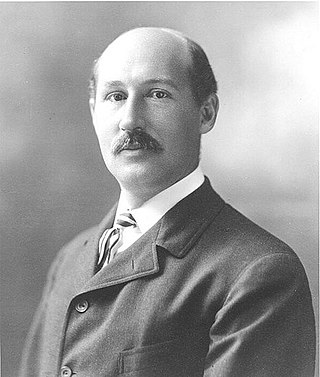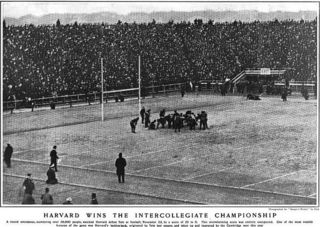The 1914 College Football All-America team is composed of college football players who were selected as All-Americans for the 1914 college football season. The only selectors for the 1914 season who have been recognized as "official" by the National Collegiate Athletic Association (NCAA) are Walter Camp, whose selections were published in Collier's Weekly, and the International News Service (INS), a newswire founded by William Randolph Hearst.
The 1907 College Football All-America team is composed of various organizations that chose basketball teams that season. The organizations that chose the teams included Collier's Weekly selected by Walter Camp.

The 1901 College Football All-America team is composed of college football players who were selected as All-Americans by various individuals who chose College Football All-America Teams for the 1901 college football season. The only two individuals who have been recognized as "official" selectors by the National Collegiate Athletic Association (NCAA) for the 1901 season are Walter Camp and Caspar Whitney, who had originated the College Football All-America Team 13 years earlier in 1889. Camp's 1901 All-America Team was published in Collier's Weekly, and Whitney's selections were published in Outing magazine.

The 1898 College Football All-America team is composed of American football players who were selected as the best players at their positions by various organizations that chose College Football All-America Teams that season. The organizations that chose the teams included Collier's Weekly selected by Walter Camp and the Syracuse Herald.
The 1903 College Football All-America team is composed of various organizations that chose College Football All-America Teams that season. The organizations and individuals that chose the teams included Collier's Weekly selected by Walter Camp, Caspar Whitney for Outing magazine, Charles Chadwick and Fielding H. Yost.
The 1904 College Football All-America team is composed of various organizations that chose College Football All-America Teams that season. The organizations that chose the teams included Collier's Weekly selected by Walter Camp.

The 1906 College Football All-America team is composed of college football players who were selected as All-Americans by various organizations and writers that chose College Football All-America Teams for the 1906 college football season. The organizations that chose the teams included Walter Camp for Collier's Weekly, Caspar Whitney for Outing Magazine, the New York World, the New York Sun, The New York Times, the New York Mail, and Charles Chadwick.
The 1905 College Football All-America team is composed of college football players who were selected as All-Americans by various organizations and writers that chose College Football All-America Teams for the 1905 college football season. The organizations that chose the teams included Walter Camp for Collier's Weekly and Caspar Whitney for Outing Magazine.

The 1908 College Football All-America team is composed of college football players who were selected as All-Americans for the 1908 college football season. The only two individuals who have been recognized as "official" selectors by the National Collegiate Athletic Association (NCAA) for the 1908 season are Walter Camp and Caspar Whitney, who had originated the College Football All-America Team 14 years earlier in 1889. Camp's 1908 All-America Team was published in Collier's Weekly, and Whitney's selections were published in Outing magazine.

The 1900 College Football All-America team is composed of college football players who were selected as All-Americans by various individuals who chose College Football All-America Teams for the 1900 college football season. The only two individuals who have been recognized as "official" selectors by the National Collegiate Athletic Association (NCAA) for the 1900 season are Walter Camp and Caspar Whitney, who had originated the College Football All-America Team eleven years earlier in 1889. Camp's 1900 All-America Team was published in Collier's Weekly, and Whitney's selections were published in Outing magazine.
The 1899 College Football All-America team is composed of college football players who were selected as All-Americans by various organizations and writers that chose College Football All-America Teams for the 1899 college football season. The organizations that chose the teams included Walter Camp for Collier's Weekly and Caspar Whitney for Outing Magazine.
The 1895 College Football All-America team is composed of college football players who were selected as All-Americans for the 1895 college football season, as selected by Caspar Whitney for Harper's Weekly and the Walter Camp Football Foundation. Whitney began publishing his All-America Team in 1889, and his list, which was considered the official All-America Team, was published in Harper's Weekly from 1891 to 1896.
The 1894 College Football All-America team is composed of college football players who were selected as All-Americans for the 1894 college football season, as selected by Caspar Whitney for Harper's Weekly and the Walter Camp Football Foundation. Whitney began publishing his All-America Team in 1889, and his list, which was considered the official All-America Team, was published in Harper's Weekly from 1891 to 1896.

The 1893 College Football All-America team is composed of college football players who were selected as All-Americans for the 1893 college football season, as selected by Caspar Whitney for Harper's Weekly and the Walter Camp Football Foundation. Whitney began publishing his All-America Team in 1889, and his list, which was considered the official All-America Team, was published in Harper's Weekly from 1891 to 1896. Harvard Law School student and football center William H. Lewis became the first African-American to be selected as an All-American in 1892, an honor he received again in 1893.

The 1892 College Football All-America team was composed of college football players who were selected as the best players at their respective positions for the 1892 college football season, as selected by Caspar Whitney for Harper's Weekly and the Walter Camp Football Foundation. Whitney began publishing his All-America Team in 1889, and his list, which was considered the official All-America Team, was published in Harper's Weekly from 1891 to 1896. Harvard Law School student and football center William H. Lewis became the first African-American to be selected as an All-American in 1892, an honor he would receive again in 1893.

The 1901 Harvard Crimson football team was an American football team that represented Harvard University as an independent during the 1901 college football season. In its first season under head coach Bill Reid, the team compiled a 12–0 record, shut out nine of 12 opponents, and outscored all opponents by a total of 254 to 24.

The 1900 Army Cadets football team represented the United States Military Academy in the 1900 college football season. In their fourth and final season under head coach Herman Koehler, the Cadets compiled a 7–3–1 record, shut out seven opponents, and outscored all opponents by a combined total of 109 to 68. The team's three losses came in games against Harvard (29–0), national champion Yale (18–0), and Navy (11–7).
The 1901 Army Cadets football team represented the United States Military Academy in the 1901 college football season. In their first and only season under head coach Leon Kromer, the Cadets compiled a 5–1–2 record, shut out four opponents, and outscored all opponents by a combined total of 98 to 22. The team's only loss was by a 6 to 0 score against an undefeated Harvard team that has been recognized as a co-national champion for the 1901 season. The Cadets also tied with Yale (5–5) and Princeton (6–6). In the annual Army–Navy Game, the Cadets defeated the Midshipmen by an 11 to 5 score.

The 1904 Army Cadets football team represented the United States Military Academy in the 1904 college football season. In their first season under head coach Robert Boyers, the Cadets compiled a 7–2 record, shut out five of their nine opponents, and outscored all opponents by a combined total of 136 to 27. The team's two losses were to Harvard and Princeton. In the annual Army–Navy Game, the Cadets defeated the Midshipmen 11–0.
The 1902 Western Conference football season was the seventh season of college football played by the member schools of the Western Conference and was a part of the 1902 college football season.










